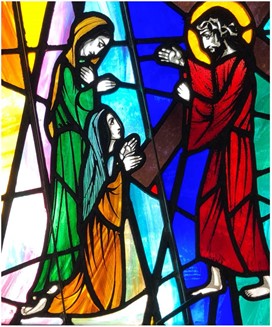

Once again, my message will focus on the contemplative dialogue Lenten program around our five foundations. During the last week, we were asked to focus on Leadership and Structure, after reflecting on the reading of the raising of Lazarus (John 11:1-45), listening to Bishop Bill break open the Word in the light of this foundation, and then view a visual liturgy about our story, and how we are attempting to understand the place of leadership and our structures in our present church context. In light of all of this, have we heard the issues raised in our synodal journey, and will the recommendations provide a renewal framework for moving forward to build the Kingdom of God together?
I am writing this message at the end of Palm Sunday, and therefore at the beginning of Holy Week. I had the privilege of being the narrator for the reading of the Passion according to Mark at Mass. The connection that stood out for me between the reading of the account of Lazarus and Mark’s account of the passion narrative was the place of women and their understanding and revelation of the humanity and divinity of the person we call Jesus.
 Martha and Mary feature prominently in the story of Lazarus. Martha goes out to meet Jesus and in conversation speaks about her brother’s death and resurrection on the last day. She then proclaims Jesus as “the Messiah, the Son of God, the one coming into the world.”
Martha and Mary feature prominently in the story of Lazarus. Martha goes out to meet Jesus and in conversation speaks about her brother’s death and resurrection on the last day. She then proclaims Jesus as “the Messiah, the Son of God, the one coming into the world.”
Martha then goes to Mary saying, “The Teacher is here and is calling for you.” It is after his exchange with both Martha and Mary that Jesus is “greatly disturbed in spirit and deeply moved.” It is from his distressed state that he prays, “Father, I thank you for having heard me. I knew that you always hear me, but I have said this for the sake of the crowd standing here, so that they may believe that you sent me.” It is at their prompting that Jesus raises Lazarus.
And yet this week, in the reading of the passion narrative, we have Jesus pleading with his apostles to stay awake and then throwing himself on the ground with fear and distress, and in prayer asks for this hour to pass him by, “Abba (Father)! Everything is possible for you. Take this cup away from me. But let it be as you, not I, would have it.”
This is the plea I hear weekly from different people about where we presently find ourselves as a church community. People are seeking a ‘better’ way to be the people of God as Catholics, and are feeling a deep sense of despair and distress.
And yet at the beginning of Mark’s passion story, we have a woman who anoints Jesus with the most expensive ointment. She is the one who recognises the Messiah and is sensitive to the journey of the cross that he will undertake. During the reading, Mark places women at the scene. He names Mary of Magdala, Mary, the mother of James the younger and Joset, and Salome. Other gospel writers include Mary the mother of Jesus and Mary of Clopas. Mark explains that these women used to follow Jesus and look after him in Galilee. He also says that there were many other women there, who had come up to Jerusalem with him. It was Mary of Magdala and Mary the mother of Joset who noted where Jesus was buried.
 While being immersed in the reading of this gospel, I was suddenly struck by the place of the women at the beginning and the end, and also the absence of the men who had run away out of fear. In last week’s gospel passage, we have Martha and Mary in deep conversation with Jesus and the death of their brother, seeking to comprehend who Jesus is in relationship to God (the Father) and their Jewish faith and heritage. And this week the women are close by, offering their love and support.
While being immersed in the reading of this gospel, I was suddenly struck by the place of the women at the beginning and the end, and also the absence of the men who had run away out of fear. In last week’s gospel passage, we have Martha and Mary in deep conversation with Jesus and the death of their brother, seeking to comprehend who Jesus is in relationship to God (the Father) and their Jewish faith and heritage. And this week the women are close by, offering their love and support.
At a time in history when the women’s voices were not recorded as part of history, I think we need to pay attention to what this might be calling us to, not only as women but as a whole community. How are we reading the five foundations, the concerns, and recommendations for our diocesan synod? Many have walked away and yet some continue to remain with the strength of their faith. This is not easy, and it requires courage, commitment, tenacity, determination as well as gentleness, patience, hope, and faith.
God revealed God’s self to the women in the person of Jesus. They encountered him in a relationship as he also engaged with them. Please take the time this week to view the recorded Stations of the Cross on the diocesan website - DOMN Stations There are scenes in this recording with students from some of our schools and there are also scenes with some of our more mature women. They are both moving and powerful and the scene with the women carrying the cross between Station 8 and 9 reflects my message.
Rose McAllister wrote the following:
As we follow Jesus on his journey, we begin to see in the sufferings of Jesus our own struggles mirrored in his. Each of us in our own way experiences the pain of the human condition: sickness reminds us of the vulnerability of our bodies, relationships break down, friends betray us, we stand by helplessly as those whom we love, suffer.
As we look at the life of Mary MacKillop, we see a woman who perseveres in the journey of faith despite the suffering that she endures. There are times when Mary comes close to despair. She is no stranger to suffering.
In her life she experiences hardship and poverty, the death of loved ones, sickness, the breakdown of a close friendship and unjust criticism; yet through it all, she places her trust in God. Mary finds strength and meaning in the cross of Jesus.
Like Jesus she finds the courage to enter into suffering rather than to run away from it. She is known as 'St Mary of the Cross MacKillop'.
I finish this week’s message with the reading of Palm Sunday from the prophet Isaiah (50:4-7)
The Lord has given me a disciple’s tongue. So that I may know how to reply to the wearied, he provides me with speech. Each morning he wakes me to hear, to listen like a disciple. The Lord has opened my ear.
We must hold on to the hope that we have not been abandoned as the psalmist cries out, “My God, my God, why have you abandoned me?” (Psalm 21)
As we move deeper into this Holy Week, may we grow ever more aware of God’s love for us and our response to that love. Over Easter I invite you once again to reflect on our five foundations and the desire expressed in the words to Build the Kingdom of God Together.
May you have a very blessed Easter.

